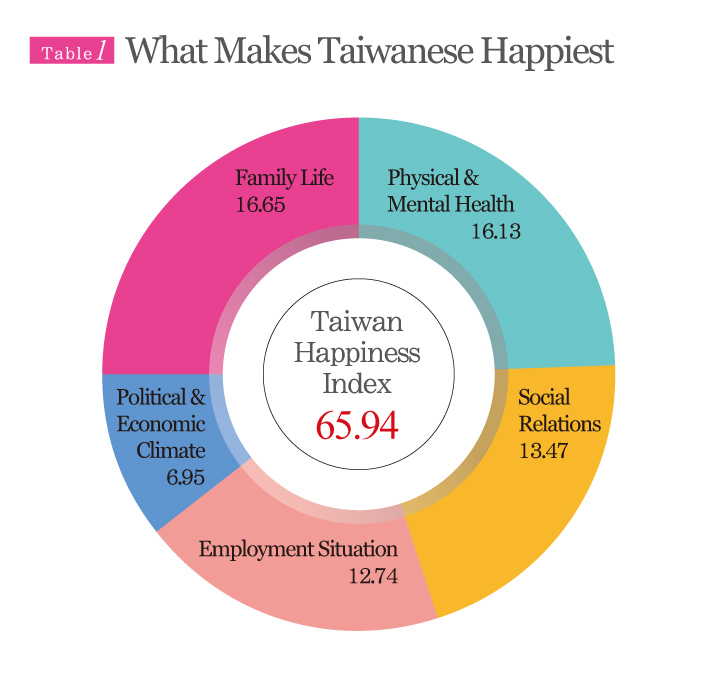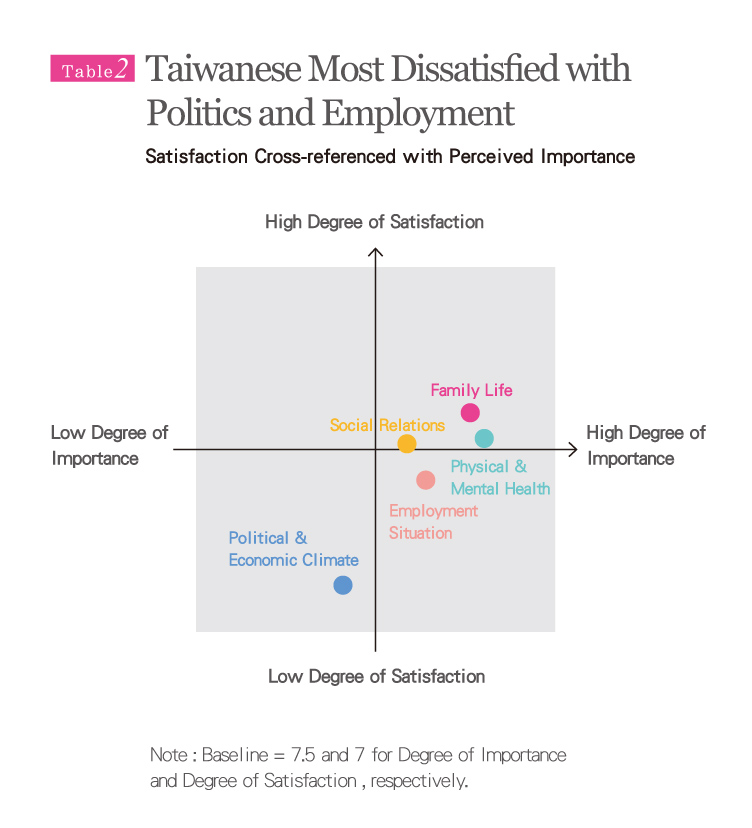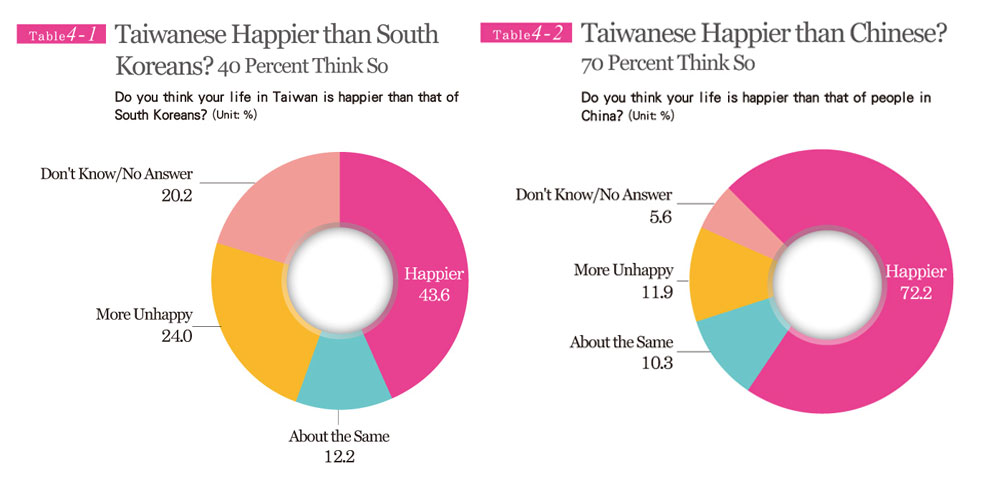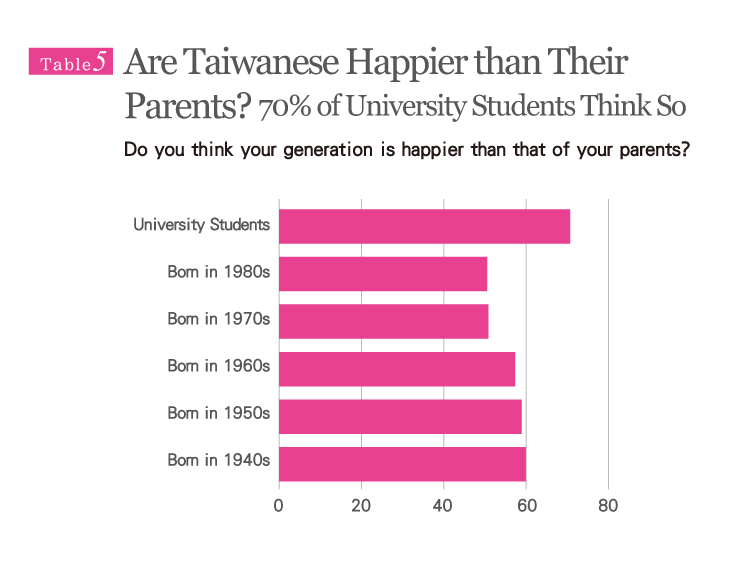Happiness Index Survey
Seeking Taiwan's Happiness Equation

Source:CW
In the first survey of its kind, CommonWealth Magazine ponders five key metrics measuring the well-being of Taiwanese society.
Views
Seeking Taiwan's Happiness Equation
By Ting-feng Wu, Mindy ChangFrom CommonWealth Magazine (vol. 500 )
Had human populations not come to be divided along class, ethnicity and other lines, they would likely still share a common faith, and we might call that shared religion "happiness."
More and more countries are currently seeking their own happiness equations.
If we liken the government to a chef and government policy initiatives to a menu, a good chef, in addition to being well practiced at his art, must also be adept at interacting with customers, tabling courses at the appropriate time in proper sequence and with just the right mix of seasonings.
"Generally speaking, government statistics should be in line with public sentiment. If there is a deviation, there must be a problem somewhere," says Chen Chien-liang, an economics professor at National Chi Nan University.
The time has come for the chef to leave the kitchen to solicit the opinions of the customers and revamp the menu. CommonWealth Magazine's "Happiness Index Survey" provides the latest list of menu requests from the customers, who are fishing out their cash (taxes) and calling for the chef to serve up the courses.
Taiwan: A Middling Score on Happiness
In its inaugural polling, Taiwan scored 65.94 points on CommonWealth Magazine's happiness index. (Table 1)
Closer analysis of the five main metrics comprising the index shows that Taiwanese feel happiest about "Family Life," which accounted for 16.65 points of the overall happiness score. That was followed, in descending order, by "Physical and Mental Health" (16.13 points), "Social Relations" (13.47 points) and "Employment Situation" (12.74 points), with the lowest score being "Political and Economic Climate" (6.95 points).
"It's a score that's not too shabby. It's up to snuff," says Chih-li Wang, director of the Department of Applied Statistics and Information Science at Ming Chuan University, chuckling that it all seemed to "make sense" as he perused the polling results.
Indeed, compared with similar results from polling organizations abroad, Taiwan's happiness ranking places it solidly in the upper middle tier internationally. And even if compared with other East Asian nations, Taiwan ranks second only to Singapore, while beating Japan and South Korea in some categories, and ranking far ahead of China.
Interpreting Taiwan's Happiness Equation
Most conventional surveys of happiness test for degree of satisfaction. The question is, does a higher degree of satisfaction really reflect a higher degree of happiness?
The answer is: not necessarily.
Someone who lives alone may pine for the company of family while caring little about political parties' rotation in and out of power. Passionate volunteers may care most about maintaining their social relationships rather than the amount they are paid. And it goes without saying that many parents are content to simply see their kids grow up healthy.
This is precisely what sets CommonWealth Magazine's Happiness Index Survey apart. Unlike previous research, this survey takes into account not only the respondents' degree of satisfaction, but also the degree of importance they assign to each of the five key metrics.
CommonWealth Magazine plotted out a positional diagram for the five surveyed metrics using relative degrees of satisfaction and importance as the axes, rating the metrics from high to low along those axes. (Table 2)
Ultimately, we discovered that respondents to the Happiness Index Survey tended to assign ratings of both high importance and high satisfaction to "Family Life," "Physical and Mental Health" and "Social Relationships."
Meanwhile, the "Employment Situation" metric was slotted into the "high importance, low satisfaction" quadrant of the diagram while respondents relegated "Political and Economic Climate" to the "low importance, low satisfaction" quadrant.
Chih-li Wang believes the new model provides a richer analytical framework that can be explained at a glance.
"With everyone viewing employment as so important yet with satisfaction so low, if the government could spare a little effort to try and push that into the quadrant with family life, wouldn't Taiwan's people immediately feel a lot happier?"
Chao-lung Liu, an associate professor with National Changhua University of Education's Department of Public Affairs and Civic Education, has intimate acquaintance with the phenomenon of "high importance, low satisfaction" when it comes to the job market.
Prior to his interview with CommonWealth Magazine, Liu had just finished teaching a class at the National Academy of Civil Service.
The students at the academy are all low-level civil servants around 28 to 30 years old, all of whom prepared two to three years just to pass the highly competitive entrance examination to gain their positions.
"Being keenly aware of such a low acceptance rate, why are so many still breaking their backs to get into the civil service?" Liu asks. "The reason is simple – jobs are hard to find out there, and nowhere else but the public sector does educational background have a direct bearing on salary and prospects for advancement. In private business, advanced degrees may at most land you a few more interviews, but that's it. They're no guarantee you'll be treated any better."
Conversely, Chen Chien-liang reminds us to bear in mind the mutual impact each of the five metrics has on one another.
To illustrate his point, Chen says there are few economies in the world as highly open and outward-looking as Taiwan, where the combined value of imports and exports is a staggering 120 percent of gross domestic product.
"Under such conditions, if we're looking to improve the job climate, it's useless to solely discuss Taiwan itself," Chen says. "Taiwan is most definitely an externally oriented economy, so the political and economic environment is key."
Sense of Happiness through the Generations
Different generations have different life experiences, and consequently feel varying levels of happiness.
CommonWealth Magazine's Happiness Index Survey asked respondents to offer self-evaluations with respect to both "now" and "five years from now."
The results showed that younger respondents were more likely to be more optimistic about future prospects. That is to say, they offered higher evaluations of where they'd be five years from now than they did for the present. (Table 3)
After cross-referencing the results to account for date of birth, perhaps the most striking thing is that respondents born since the 1980s (age 22-31) evaluated their present situations lower than any age group yet were the most optimistic about their prospects five years hence.
Plainly stated, children of the 80s see their current starting point as lagging furthest behind but are quite confident they'll overtake the frontrunners later.
"Perhaps it's that things can't get any worse," says one such newly employed young person. "When I graduated, academic credentials had become devalued, and on top of that we ran up against the financial crisis, and unpaid furloughs. As long as you have a job now, things can always gradually get better later."
From the perspective of older respondents, the high degree of optimism among young people is puzzling. Chih-li Wang notes that he has constantly expressed anxiety about the future careers of graduating students but has often found "the emperor at ease while the court eunuchs are worried to death" (i.e., the person involved isn't concerned but observers are apprehensive).
"Those born in the 1940s, 1950s and 1960s, are more cautious, having lived through the era when Taiwan was ahead of China and South Korea. They know there has been a change in the weather," Chen Chien-liang echoes. "Young people don't really have that sense of crisis."
From government and business to academia and the media, many observers often compare Taiwan to South Korea and China. As its economy has surged forward, South Korea has become the seventh country in the world with per capita income exceeding US$20,000 and a population of more than 50 million. China meanwhile is more economically vibrant than Taiwan, with annual economic growth of more than eight percent.
CommonWealth Magazine's Happiness Index Survey found that, contrary to general expectations, the Taiwanese public is not particularly envious of either South Korea or China.
A solid 44 percent of respondents felt life was better in Taiwan than in South Korea. Much more overwhelming, fully 72 percent of respondents felt Taiwanese were happier than people in China. (Table 4)
"Is there a connection between sense of happiness and the media?" Chen Chien-liang wonders. "If the media is constantly broadcasting negative, malicious content, amplifying people's shortcomings, amplifying social disasters, will that not also make them fail to recognize the validity of objective, tangible indices?"
The Younger, the More Unhappy
Everyone has heard their parents retell stories from their lives. Whether we feel happy or not ourselves is often inseparable from our perspective on the lives our parents have experienced.
The survey showed that the lower the age of respondents, the less likely they were to consider themselves happier than their parents. However, the youngest generation of adults, those currently of university age, proved an exception, with as many as 70 percent identifying themselves as happier than the previous generation. (Table 5)
To some extent, this implies that Taiwanese social mobility is headed toward stagnation.
"The older generations had the likes of Wang Yung-ching and Terry Gou, those classic models of guys who started out with nothing," Chao-lung Liu, the associate professor from National Changhua University of Education, contends. "Where are the role models of success for today's younger generation? Quite honestly, a lot of them have grown up privileged. It's gone from 'starting out with nothing' to 'Elder Brother and Dad sure are great.' You tell me, how big is this generation gap?"
A lot of research has also shown that the state of material conditions is not the sole determining factor in sense of happiness.
"In the past, material conditions were bad, but career tracks were unimpeded. Now, it's exactly the opposite," Liu explains.
Despite being born into an age of wealth and prosperity, young people are increasingly taking to the streets and the Internet demanding reform. Apparently Taiwan's "happiness crisis" may also be a political crisis. Just what is the government to do to defuse this increasingly urgent situation?
The best government policy would provide relief where it is needed most. The red meat government policy might provide must not only be doled out appropriately but also swiftly.
CommonWealth Magazine's Happiness Index Survey specifically listed "increasing employment opportunities," "controlling inflation," "improving the quality of medical care," "improving living conditions and environmental quality," and "making taxation fairer" as the five areas of greatest interest for government policy.
The Happiness Index Survey referenced the methods of a Harvard University survey concerning the political attitudes of young Americans sought to better understand public priorities on major public policy issues by having respondents rank the importance of each against the others. The study's objective was to initiative a more focused discussion on policy between government and the public.
The CommonWealth Magazine survey found that increasing employment opportunities is currently the highest policy priority for raising public well-being. Secondarily, the policies that most concern Taiwanese citizens are controlling commodity price inflation and improving the quality of health care.
Robert E. Lane, Eugene Meyer Professor Emeritus of Political Science at Yale University, is a pioneer in the field of happiness research.
The finding of Dr. Lane's research was this: although material wealth and prosperity cannot necessarily buy you greater happiness, they remain necessary components. This is because without a flourishing economic environment, people have no sense of security, and thus fear triumphs over happiness.
"This is now an age of diverse values. The government cannot decide for people what constitutes a happy life, but it has the responsibility to guarantee the rights of different people, and give them the ability to pursue a happy life for themselves," Wang Kuan-sheng, assistant professor at National Taipei University's Center for General Education, concludes.
Translated from the Chinese by Brian Kennedy










